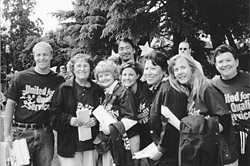|
SEIU Joins Forces to Organize Developmentally Disabled May 2002 Putting into practice the SEIU New Strength Unity Program, Local 535and five other SEIU local unions are working together throughout the state to organize and improve services for 26,000 workers in the developmentally disabled community. Called United for Quality Services, the statewide campaign is focused on improving public funding for agencies that employ DD workers. Organizers and employers have united in the campaign to lobby for more funding to improve the lives of the developmentally disabled and their workers. “For years these workers have suffered from low pay, lack of a voice, and few benefits. The funding is most important,” says Damita Davis-Howard, 535 staff director and 535 campaign organizer. “Agencies that employ workers who work with the developmentally disabled don’t have enough money to increase pay and benefits because the state routinely underfunds these services. Before we can organize unorganized workers, we have to improve the state funding for their services.” SEIU and The Association of Regional Center Agencies co-sponsored a Grassroots Lobby Day in the capitol. SEIU members, consumers, parents, advocates, and employers, united behind a vision of a stronger and more humane system of services and support for people with developmental disabilities, jointly formed lobby teams which visited over 36 legislators in the capitol. Since then, 535 members have participated in two additional lobby days on behalf of the developmental disabilities community and testified at various budget committee hearings. In addition, SEIU members and community activists have made over 1,000 phone calls and sent over 520 faxes and e-mails to the Senate Budget Subcommittee members. “We want them to feel the pain and pressure when they vote to make cuts in the DDS budget,” says Davis-Howard. “This is an atypical organizing campaign,” says Davis-Howard, “because we are working with employers for a change. We are bringing our expertise and successful experiences in lobbying the legislature and governor for low-paid workers, like the effort for home care workers. Until labor got involved, home care workers suffered from the same problems: low wages, no benefits, and invisibility. Our experience has shown that when the union unites with community organizations, advocates, parents, and consumers we have been able to win significant improvements.” Over the past few months unions have held five regional meetings throughout the state. In-Home Supportive Services workers, special education school aides, people with developmental disabilities, and their family members have gathered to discuss improving services. They are united about the problems in California’s developmental disability system, including a severe shortage of funding from the state, high turnover among direct care staff caused by low pay and benefits, a lack of accessible information for consumers and their families about where to find services, and a lack of training opportunities for workers.
|
|||||||

